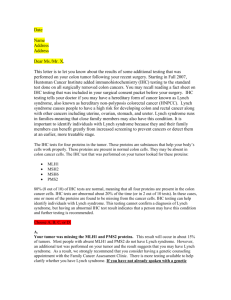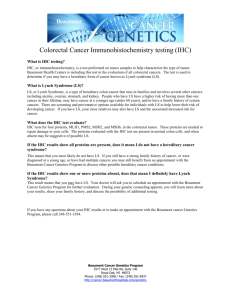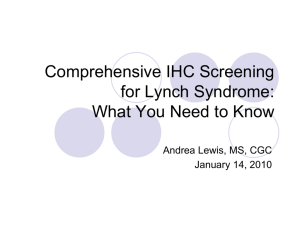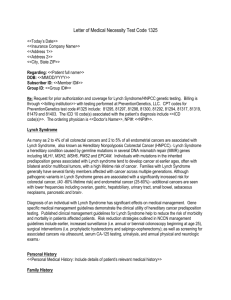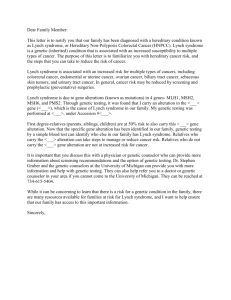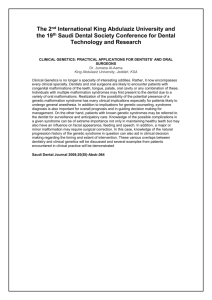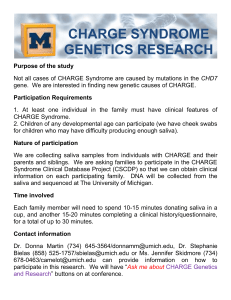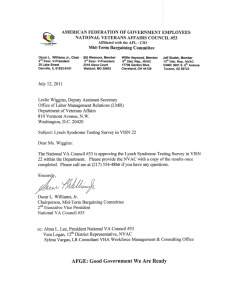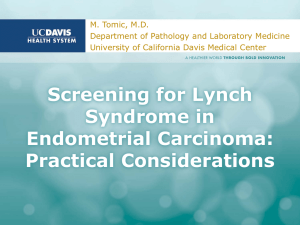Ohio State - Lynch Syndrome Screening Network
advertisement
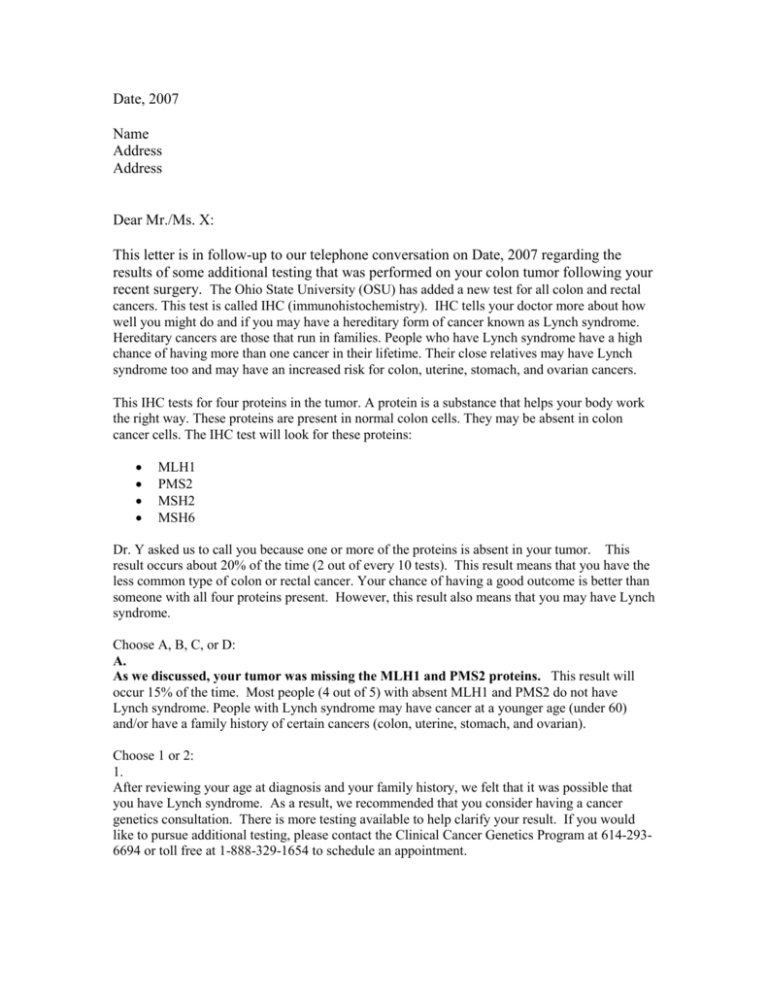
Date, 2007 Name Address Address Dear Mr./Ms. X: This letter is in follow-up to our telephone conversation on Date, 2007 regarding the results of some additional testing that was performed on your colon tumor following your recent surgery. The Ohio State University (OSU) has added a new test for all colon and rectal cancers. This test is called IHC (immunohistochemistry). IHC tells your doctor more about how well you might do and if you may have a hereditary form of cancer known as Lynch syndrome. Hereditary cancers are those that run in families. People who have Lynch syndrome have a high chance of having more than one cancer in their lifetime. Their close relatives may have Lynch syndrome too and may have an increased risk for colon, uterine, stomach, and ovarian cancers. This IHC tests for four proteins in the tumor. A protein is a substance that helps your body work the right way. These proteins are present in normal colon cells. They may be absent in colon cancer cells. The IHC test will look for these proteins: MLH1 PMS2 MSH2 MSH6 Dr. Y asked us to call you because one or more of the proteins is absent in your tumor. This result occurs about 20% of the time (2 out of every 10 tests). This result means that you have the less common type of colon or rectal cancer. Your chance of having a good outcome is better than someone with all four proteins present. However, this result also means that you may have Lynch syndrome. Choose A, B, C, or D: A. As we discussed, your tumor was missing the MLH1 and PMS2 proteins. This result will occur 15% of the time. Most people (4 out of 5) with absent MLH1 and PMS2 do not have Lynch syndrome. People with Lynch syndrome may have cancer at a younger age (under 60) and/or have a family history of certain cancers (colon, uterine, stomach, and ovarian). Choose 1 or 2: 1. After reviewing your age at diagnosis and your family history, we felt that it was possible that you have Lynch syndrome. As a result, we recommended that you consider having a cancer genetics consultation. There is more testing available to help clarify your result. If you would like to pursue additional testing, please contact the Clinical Cancer Genetics Program at 614-2936694 or toll free at 1-888-329-1654 to schedule an appointment. 2. After reviewing your age at diagnosis and your family history, we felt that it was unlikely that you have Lynch syndrome. As a result, we did not recommend that you schedule a full consultation with Clinical Cancer Genetics. B. As we discussed, your tumor was missing the MSH2 and MSH6 proteins. These results occur less than 5% of the time. Most people with these results have Lynch syndrome. As a result, we strongly recommended that you consider having a clinical cancer genetics consultation. There is more testing available to help clarify your result for you and your family. If you would like to consider additional testing, please contact the Clinical Cancer Genetics Program at 614-293-6694 or toll free at 1-888-329-1654 to schedule an appointment. C. As we discussed, your tumor was missing the MSH6 protein only. These results occur less than 5% of the time. Most people with these results have Lynch syndrome. As a result, we strongly recommended that you consider having a clinical cancer genetics consultation. There is more testing available to help clarify your result for you and your family. If you would like to consider additional testing, please contact the Clinical Cancer Genetics Program at 614-293-6694 or toll free at 1-888-329-1654 to schedule an appointment. D. As we discussed, your tumor was missing the PMS2 protein only. These results occur less than 5% of the time. Most people with these results have Lynch syndrome. As a result, we strongly recommended that you consider having a clinical cancer genetics consultation. There is more testing available to help clarify your result for you and your family. If you would like to consider additional testing, please contact the Clinical Cancer Genetics Program at 614-293-6694 or toll free at 1-888-329-1654 to schedule an appointment. Sincerely, Heather Hampel, M.S., CGC Certified Genetic Counselor Clinical Associate Professor cc: Dr. Y Medical Records Judith A. Westman, M.D., FAAP, FACMG Clinical Geneticist Professor, Internal Medicine
